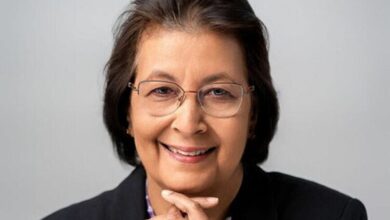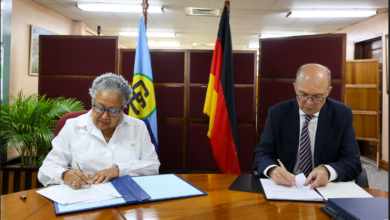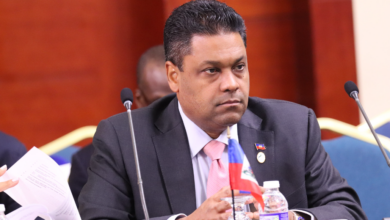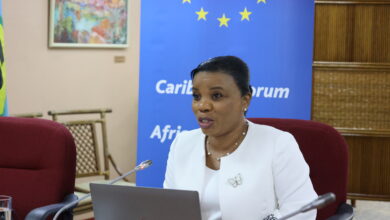The Inaugural Meeting of the Council for Foreign and Community Relations (COFCOR) was held in Paramaribo, Suriname on 12-13 May, 1998. The Council was established by Article 8 (b) of Protocol I amending the Treaty of Chaguaramas. The Ministers of Foreign Affairs attending were: the Hon. Janet Bostwick, Minister of Foreign Affairs and Minister with responsibility for CARICOM Affairs, The Bahamas; the Hon. Billie A. Miller, Deputy Prime Minister and Minister of Foreign Affairs, Tourism and International Transport, Barbados; the Hon. Dean O. Barrow, Deputy Prime Minister and Minister of Foreign Affairs, National Security and Attorney-General, Belize; Dr. the Hon. Raphael Fletcher, Minister of Foreign Affairs, Grenada; the Hon. Clement Rohee, Minister of Foreign Affairs, Guyana; the Hon. George Odlum, Minister of Foreign Affairs and International Trade, Saint Lucia; the Hon. Erroll G. Snijders, Minister of Foreign Affairs, Suriname; the Hon. Ralph Maraj, Minister of Foreign Affairs, Trinidad and Tobago. Other Ministers in attendance were: the Hon. Hilroy Humphreys, Minister of Trade, Industry and Commerce, representing the Hon. Lester Bird, Prime Minister and Minister of Foreign Affairs, Antigua and Barbuda; the Hon. Norris Charles, Minister in the Ministry of Foreign Affairs, Trade and Marketing, representing the Hon. Edison James, Prime Minister and Minister of Foreign Affairs, Dominica. Also representing their respective countries were: H.E. Mr. Stafford Neil, Permanent Secretary, Ministry of Foreign Affairs and Foreign Trade, Jamaica; H.E. Mr. St. John Payne, Ambassador of St. Kitts and Nevis to CARICOM, St. Kitts and Nevis; and M. Jean-Robert Hérard, Special Adviser to the Minister of Foreign Affairs of Haiti.
OPENING CEREMONY
In his statement at the Opening Ceremony, the Secretary-General highlighted the fact that this was the inaugural meeting of the Caribbean Community Council for Foreign and Community Relations, an Organ of the Community, created by the recently adopted
Protocol I which amended the Treaty of Chaguaramas. The Secretary-General also signalled that it was the first Meeting of any Organ of the Caribbean Community to be held in Suriname, since that country joined the Caribbean Community in July, 1995 and was proof of Suriname’s determination to play its full part in the life of the Caribbean Community.
In his statement, the Hon. Norris Charles, of Dominica representing the outgoing Chairman, Prime Minister Edison James, stressed the need for more effective foreign policy coordination among CARICOM Member States, noting that this issue had been placed high on the agenda of the deliberations of the First Meeting of COFCOR, The Minister further stressed the importance of Foreign Policy Coordination to the Community and the Single Market and Economy, which he expected to become a reality in 1999.
The Minister also emphasised the Region’s need ensure that the interests of the smaller economies were safeguarded in the FTAA process.
In his statement, the Minister of Foreign Affairs of Suriname, the Hon. Errol Snijders expressed the view that the new needs and demands of the changing world order in which globalisation and trade liberalisation were key aspects, was forcing the Community to incorporate the impact of such changes in formulating both national and foreign policies.
He emphasised that, at the national and regional levels, it was necessary to adopt appropriate policies to keep pace with international developments and at the same time, join forces to protect the Region’s interests.
He added that concerted efforts should be geared, inter alia, towards the strengthening of the Region’s productive base and the improvement of its competitiveness, either through enhanced cooperation and alliances between governments, or through private sector and non-governmental initiatives.
In his address, the Foreign Minister of Saint Lucia, the Hon. George Odlum, stressed the importance of cooperation within the Community family and the need to press on with integration at a pace more in keeping with the expectations of the peoples of the Region. In so doing, the Minister called on the integration process to reassemble the shattered fragments of Caribbean integration with love, care and a sense of mission, promising thereby a Caribbean society with lasting mores, inspired direction and a people bound each to each by natural piety.
SPECIAL ADDRESS BY THE PRESIDENT OF SURINAME
In a special address to the Inaugural Meeting of the COFCOR, President Jules Albert Wijenbosch observed that the Region was living in a rapidly evolving world of dramatic developments, noticeable particularly in the economic area, and the consequences of this transformation process had not by-passed a single country. This process, he said, had strongly emphasised the need for close cooperation among members so as to safeguard the Region’s interest within the framework of the FTAA, to successfully negotiate a successor Agreement to Lomé IV and for adequate participation in international organisations such as the Organisation of American States (OAS) and the United Nations (UN).
He emphasised the importance of closely monitoring these developments, but even more so of anticipating and making every effort to influence this process for the benefit of our nations.
THE ESTABLISHMENT OF A COUNCIL FOR
FOREIGN AND COMMUNITY RELATIONS
Ministers adopted Rules of Procedure for the effective functioning of the Council for Foreign and Community Relations. These rules provide, inter alia, for an annual meeting of the Council, with Extraordinary meetings being summoned, as necessary.
Ministers recognised that with the provisional entry into force of Protocol I, their deliberations were now being conducted in a decision-making rather than an advisory forum. They also recognised the expectations which would derive from the new status given to their deliberations.
MORE EFFECTIVE COORDINATION OF THE FOREIGN
POLICIES OF MEMBER STATES
A significant part of the Meeting’s agenda focussed on the development of strategy in the Region’s external relations. Against that background, the Council reviewed its relations with countries in Africa, Asia, the Caribbean, Europe and Latin America.
SUMMIT OF THE AMERICAS
The Ministers reviewed the results of the Second Summit of the Americas and their implications for the future of hemispheric relations.
They paid particular attention to the decision to launch the negotiations for the creation of a Free Trade Area of the Americas and reiterated the need for the establishment of a Regional Integration Fund. They re-committed themselves to intensifying their efforts to win support for the concept in the context of the post-Santiago process.
The Ministers agreed that the Region’s commitment to the hemispheric process would require sustained and coordinated participation.
They reaffirmed the role of the Summit Implementation Review Group (SIRG) in the follow-up to the Summit of the Americas and urged that the role assigned to the OAS should not result in the diversion of resources from OAS Technical Assistance projects from which the Region currently benefits.
CARIBBEAN/UNITED STATES
Ministers reviewed the results of the First Annual Meeting of Ministers of Foreign Affairs of the nations of the Caribbean and the Secretary of State of the United States of America held in Trinidad and Tobago in April 1998 as part of the follow-up to the Caribbean/United States Summit held in May 1997. In commenting on this Meeting, Ministers noted the considerable progress which had been made on the justice and security issues. They however expressed disappointment that, notwithstanding the best efforts of the Caribbean, there had not been commensurate progress in the trade and economic issues.
Ministers also underscored their concern with regard to the deportation to the Region of hardened criminals with tenuous original links to the Caribbean, and the consequential negative impact of such criminals on the social and civil fabric of Caribbean society.
CARIBBEAN-UK FORUM
Ministers reviewed follow-up activities arising out of the Caribbean-UK Forum held in Nassau, The Bahamas in February 1998.
They noted the UK proposal to convene a Marine Biodiversity Workshop for the Caribbean in Jamaica in October/November 1998 and the feasibility study on the Caribbean Inward Investment Office which was currently under examination by Member States.
Ministers also noted the UK proposal that the next Meeting of the Forum be held in London in 2000, as well as the offer by the Government of Guyana to host the following Meeting, scheduled to be held in the Region.
CUBA
Ministers evaluated the results of the Fourth Meeting of the CARICOM/Cuba Joint Commission held in Havana in December 1997. They agreed that the Fifth Meeting of the Joint Commission be held in Georgetown, Guyana during the second half of 1998, preceded by a Caribbean/Cuba Trade and Investment Seminar.
Ministers strongly supported the early establishment of a Trade Facilitation Office in Havana.
CARICOM-CANADA
Ministers noted that the Fifth Summit among Heads of Government of CARICOM and Canada had taken place in The Bahamas on 16 April, 1998. They recognised the special relations which continued to exist between CARICOM and Canada as exemplified during the discussions at both the Summit and the Ninth Meeting of the CARICOM-Canada Joint Trade and Economic Committee held in Guyana from 19-20 February, 1998.
They noted that the Protocol to provide for the Government of Suriname to become a Party to the Trade and Economic Cooperation Agreement between the Government of Canada and the Governments of the Member States of the Caribbean Common Market had been signed by all but two CARICOM States and urged the early completion of the signatory process.
HAITI
The Council reviewed the progress made with regard to Haiti’s membership of CARICOM. They were encouraged by the results of the visit of the CARICOM Secretariat team to Haiti from 27 April to 1 May 1998, which formed a useful basis for launching negotiations between CARICOM and Haiti on the Terms and Conditions of Haiti’s membership of the Community.
BELIZE/GUATEMALA RELATIONS
The Ministers expressed their unwavering support for the sovereignty, territorial integrity and security of Belize.
They welcomed the continued dialogue between the Governments of Belize and the Republic of Guatemala.
They expressed the hope that the talks would result in a solution to Guatemala’s territorial claim, consistent with the principles of good neighbourliness, mutual respect for sovereignty, and the acceptance of Belize’s constitutionally established and internationally recognised borders.
The Ministers noted that the relations between Guyana and Venezuela were good and that the two countries were continuing to work towards the further strengthening of existing programmes of functional cooperation. They also took note of the fact that Venezuela was the first country to send a message of congratulation to the newly elected Government in Guyana following the December 15, 1997 National and Regional elections in Guyana.
They noted that the discussions under the aegis of the Secretary-General of the United Nations were proceeding in a cordial and positive atmosphere.
The Ministers reaffirmed their full support for the territorial integrity and sovereignty of Guyana and reiterated their commitment to a peaceful settlement to the Guyana/Venezuela controversy.
THE ENVIRONMENT AND THE CARIBBEAN SEA
Ministers emphasised the critical importance of the Caribbean Sea to the livelihood of the littoral States and in this regard, supported the proposal for the international recognition of the Caribbean Sea as a Special Area in the context of Sustainable Development. Ministers also reaffirmed their total opposition to the transshipment of nuclear waste through the Region.
Ministers also urged Member States to participate fully in the “Caribbean Sea Forum” scheduled for Port-of-Spain, Trinidad and Tobago from 3-6 June 1998 which would be convened by the CARICOM Secretariat, in collaboration with the Organisation of American States (OAS), the Canadian International Development Agency (CIDA), the United Nations Environmental Programme (UNEP), the Commonwealth Science Council (CSC) and the Institute of Marine Affairs (IMA).
UN SPECIAL SESSION ON DRUGS
The Council recognised that the worldwide drug problem continued to undermine economic and social development, particularly in small developing states and emphasised the special importance of promoting preventive action with respect to illegal arms trafficking, which is linked to the drug trade. The Council therefore welcomed the convocation of the Special Session of the UN General Assembly on Narcotic Drugs to be held in June 1998.
They noted the intention of Suriname to organise a sub-regional conference on drugs involving Guyana, Brazil, France and Venezuela in the second half of this year to develop strategies and actions against the illicit production, sale, demand, traffic and distribution of narcotic drugs and psychotropic substances.
Ministers reiterated their recognition of the importance of having a regional institution for training in diplomacy, for research and for the provision of advice for policy development. They stressed the need for transforming the Institute of International Relations into an institution more relevant to the contemporary needs of the Region.
The Council appointed a Sub Committee to monitor the transformation process.
ORGANISATION OF AMERICAN STATES (OAS)
The Council took the opportunity to pay tribute to the Organisation of American States (OAS) on the celebration of its 50th Anniversary which coincides with CARICOM’s own celebration of its Silver Jubilee.
The Council urged the OAS to ensure that funds allocated in the regular budget of the OAS for issues of concern to the Region, particularly fellowships and training, were not diverted to activities flowing from the Summit of the Americas process.
THE ASSOCIATION OF CARIBBEAN STATES (ACS)
Ministers reiterated their conviction that the potential offered by the ACS, an initiative promoted by CARICOM, in the areas of trade, functional cooperation and collaboration in international fora, remained to be fully exploited. They also recognized the challenges facing the Association. They expressed satisfaction with the activities being undertaken in areas such as tourism, natural resources, the environment and the Caribbean Sea and the efforts to establish an ACS-wide trade information system.
Ministers agreed to intensify their participation in the organisation in pursuit of the strategic regional objectives.
Ministers noted that the Fourth Ministerial Meeting of the ACS would be held in Barbados in November, 1998.
APPRECIATION
Ministers expressed profound appreciation to the Government and people of Suriname for their warm and friendly hospitality and for the thought and effort which went into the excellent arrangements made for the conduct of the business of the Meeting and which contributed in no small measure to its successful outcome.
DATE AND VENUE
The Ministers also accepted the offer the Government of St. Kitts and Nevis to host the Second Meeting of the COFCOR in that country in May 1999.
Paramaribo, Suriname
13 May 1998





